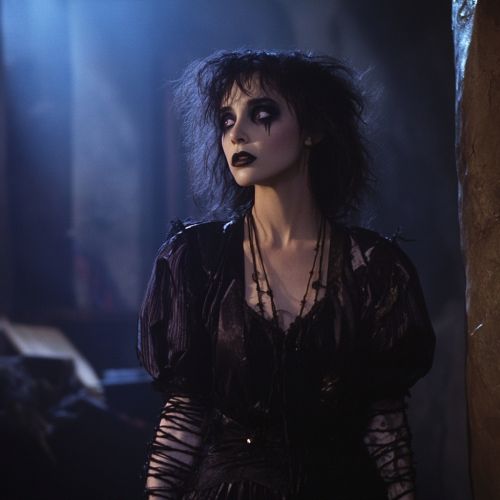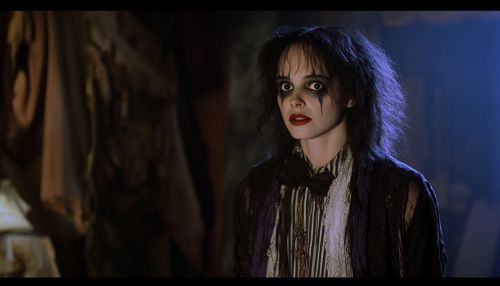Winona Ryder: Difference between revisions
(Created page with "== Early Life and Education == Winona Ryder, born Winona Laura Horowitz on October 29, 1971, in Winona, Minnesota, is an American actress renowned for her distinctive screen presence and versatility. Her parents, Cynthia Palmer (née Istas) and Michael Horowitz, were both writers and editors with a deep interest in literature and counterculture. Ryder's family moved to Petaluma, California, when she was seven years old. Her upbringing was marked by an eclectic mix of inf...") |
No edit summary |
||
| Line 7: | Line 7: | ||
Ryder's film debut came in 1986 with the film [[Lucas (film)|Lucas]], where she played a supporting role. Her performance garnered attention and led to her casting in the 1988 cult classic [[Beetlejuice]], directed by [[Tim Burton]]. In Beetlejuice, Ryder portrayed Lydia Deetz, a goth teenager with a penchant for the macabre. The film's success established her as a rising star in Hollywood. | Ryder's film debut came in 1986 with the film [[Lucas (film)|Lucas]], where she played a supporting role. Her performance garnered attention and led to her casting in the 1988 cult classic [[Beetlejuice]], directed by [[Tim Burton]]. In Beetlejuice, Ryder portrayed Lydia Deetz, a goth teenager with a penchant for the macabre. The film's success established her as a rising star in Hollywood. | ||
[[Image:Detail-97963.jpg|thumb|center|Winona Ryder in a scene from Beetlejuice, wearing gothic attire and standing in a dark, eerie room.|class=only_on_mobile]] | |||
[[Image:Detail-97964.jpg|thumb|center|Winona Ryder in a scene from Beetlejuice, wearing gothic attire and standing in a dark, eerie room.|class=only_on_desktop]] | |||
== Breakthrough and Critical Acclaim == | == Breakthrough and Critical Acclaim == | ||
Latest revision as of 09:25, 13 September 2024
Early Life and Education
Winona Ryder, born Winona Laura Horowitz on October 29, 1971, in Winona, Minnesota, is an American actress renowned for her distinctive screen presence and versatility. Her parents, Cynthia Palmer (née Istas) and Michael Horowitz, were both writers and editors with a deep interest in literature and counterculture. Ryder's family moved to Petaluma, California, when she was seven years old. Her upbringing was marked by an eclectic mix of influences, including the Beat Generation and the burgeoning punk rock scene.
Ryder attended Petaluma High School but faced significant challenges, including bullying due to her unconventional appearance and interests. Despite these difficulties, she found solace in acting and enrolled at the American Conservatory Theater in San Francisco, where she honed her craft.
Career Beginnings
Ryder's film debut came in 1986 with the film Lucas, where she played a supporting role. Her performance garnered attention and led to her casting in the 1988 cult classic Beetlejuice, directed by Tim Burton. In Beetlejuice, Ryder portrayed Lydia Deetz, a goth teenager with a penchant for the macabre. The film's success established her as a rising star in Hollywood.


Breakthrough and Critical Acclaim
Ryder's breakthrough role came in 1989 with Heathers, a dark comedy that satirized high school culture. Her portrayal of Veronica Sawyer, a disillusioned teenager navigating a treacherous social hierarchy, was both critically acclaimed and commercially successful. This role cemented her status as a leading actress in Hollywood.
In 1990, Ryder starred in Edward Scissorhands, another collaboration with Tim Burton. Playing opposite Johnny Depp, she portrayed Kim Boggs, a suburban girl who falls in love with the titular character. The film was a critical and commercial success, further solidifying Ryder's reputation as a versatile and talented actress.
1990s: Peak Career
The 1990s were a prolific period for Ryder, marked by a series of high-profile roles and critical acclaim. In 1992, she starred in Bram Stoker's Dracula, directed by Francis Ford Coppola. Her portrayal of Mina Harker showcased her ability to handle complex and dramatic roles.
Ryder's performance in The Age of Innocence (1993), directed by Martin Scorsese, earned her an Academy Award for Best Supporting Actress nomination. She played May Welland, a young woman caught in a love triangle in 19th-century New York society. Her nuanced performance was praised for its depth and sensitivity.
In 1994, Ryder starred in Little Women, an adaptation of Louisa May Alcott's classic novel. Her role as Jo March, a headstrong and independent young woman, earned her a second Academy Award nomination, this time for Best Actress.
2000s: Career Challenges and Resurgence
The early 2000s were challenging for Ryder, both personally and professionally. In 2001, she faced legal issues, including charges of shoplifting, which garnered significant media attention. Despite these setbacks, Ryder continued to work in the industry, albeit with fewer high-profile roles.
Her career saw a resurgence in the mid-2000s with roles in films such as A Scanner Darkly (2006), an adaptation of Philip K. Dick's novel, and Star Trek (2009), where she played Amanda Grayson, Spock's mother.
2010s: Return to Prominence
Ryder's career experienced a significant revival in the 2010s, largely due to her role in the Netflix series Stranger Things. Premiering in 2016, the show became a cultural phenomenon, and Ryder's portrayal of Joyce Byers, a mother searching for her missing son, was widely praised. Her performance earned her nominations for several awards, including the Screen Actors Guild Award.
Personal Life
Ryder has been known for her relationships with high-profile figures in the entertainment industry, including Johnny Depp and Matt Damon. Despite her public persona, she has maintained a relatively private personal life.
Ryder is also known for her philanthropic efforts, particularly in the areas of mental health awareness and support for the arts. She has been open about her struggles with anxiety and depression, using her platform to advocate for mental health issues.
Legacy and Influence
Winona Ryder's impact on the film industry is significant, marked by her ability to navigate both mainstream and independent cinema with ease. Her roles in iconic films of the 1980s and 1990s have left an indelible mark on popular culture. Ryder's career resurgence with Stranger Things has introduced her to a new generation of fans, ensuring her legacy endures.
